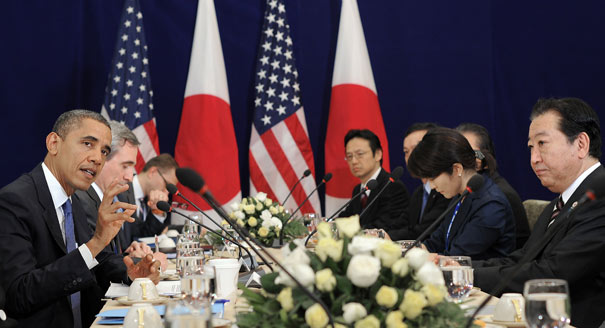Registration
You will receive an email confirming your registration.
IMGXYZ4054IMGZYXWhile headlines relating to U.S.-Japan relations are currently dominated by elections, budget battles, and regional security tensions, it is worth stepping back and viewing the relationship in a multidisciplinary context. From a wider perspective, the nexus of religion, Middle East policy, energy, and domestic politics in U.S.-Japan relations helps to clarify priorities and opportunities. Three outstanding Japanese scholars explored implications of this backdrop for the alliance and for new political leadership in 2013 and beyond.
Doshisha University’s Koji Murata discussed the religious aspect of the U.S.-Japan relationship, Kunihiko Miyake of the Canon Institute for Global Studies took a wide-angle view of strategic and geopolitical issues in the Middle East, and the Nikkei Newspapers’ Hisayoshi Ina analyzed domestic Japanese politics before the national election. Carnegie’s Jim Schoff moderated.
Religion in U.S.-Japan Relations
- Domestic Politics: Because the majority of the Japanese population is not religious, the Japanese tend to either underestimate or overestimate the importance of religion in U.S. domestic politics, Murata said. He explained that in modern Japanese history, major disasters such as the 2011 tsunami and nuclear incident at Fukushima have tended to cause a religious revival or a strengthening of community ties among the Japanese people. These big events have also led to the rise of new political parties in the past, he said.
- Religion and the Middle East: Since many citizens are ignorant about Islam, both the United States and Japan are currently trying to promote strategically important Middle Eastern and Islamic studies, Murata said. Murata recommended that the United States and Japan cooperate to produce comparative and comprehensive studies from different perspectives. This approach can also be useful for Chinese studies, he added. Overall, Murata argued that strictly strategic regional studies are not enough—he called on both countries to combine their human resources to tackle global problems, taking advantage of their cultural synergy.
A Geostrategic View of the Middle East
- Power Vacuums: Miyake explained that historically, power vacuums in the Middle East have created new sets of conflicts. He presented several examples:
- The Gulf: After British forces withdrew east of the Suez, the resulting power vacuum in the Gulf region was filled by the Shah of Iran.
- Iran: After the fall of the Shah in 1978-1979, the resulting power vacuum invited Saddam to attack Iran and the Soviet Union to invade Afghanistan.
- Afghanistan: After the Soviets left Afghanistan in 1988, they were replaced by al-Qaeda and the Taliban. Miyake argued that the withdrawal of U.S. forces from Iraq and Afghanistan will create a similar power vacuum that will lead to another war in the region, probably involving Iran and the United States.
- Strategic Priorities: By 2020, Miyake predicted that the United States will no longer be able to fight two major wars or two regional conflicts simultaneously—it must choose between deploying its maritime strength to the Middle East or Asia. In the event of a power vacuum leading to a conflict in the Middle East, Miyake predicted that the United States will prioritize that region over Asia, and the U.S-Japan alliance should prepare for this possibility.
The Japanese Election
- New Leaders, New Challenges: Media polls are now predicting that Japan’s center-right Liberal Democratic Party (LDP) will win a majority in the December 16 elections, and Shinzo Abe will regain the position of prime minister, Ina said. Japan faces a number of challenges, including a declining share of world GDP and increased Sino-Japanese tension. Ina predicted Japan will respond to these challenges by strengthening its U.S. alliance, engaging cautiously with China, firmly defending disputed territories, and entering fishing rights negotiations with Taiwan.
- The World at Large: Japan has territorial disputes with several neighboring countries, but upcoming anniversaries of regional peace treaties will provide an opportunity for “calendar diplomacy,” Ina said. The U.S. shale gas revolution will be important for Japan, he added. As the United States becomes an energy supplier, this could weaken Russia’s position toward Japan. He recommended that Japan import U.S. shale gas and move forward on TPP negotiations.
- New Opportunities: Schoff said that new administrations in the United States, Japan, South Korea, and China provide an important opportunity to reassess and readdress foreign policy and diplomatic challenges. He worried, however, that an Abe government might dwell too much on revising the post-World War II order in Japan, including constitutional revision and other steps that could alienate South Korea and China. If so, then the allies would not be well positioned to take advantage of diplomatic opportunities in the region in 2013, Schoff said. He emphasized that the two countries have different and often complementary strengths in the region, and echoed Murata’s call for multi-disciplinary collaboration.
This event was cosponsored by the U.S.-Japan Research Institute and the Center for Interdisciplinary Study of Monotheistic Religions at Doshisha University.
